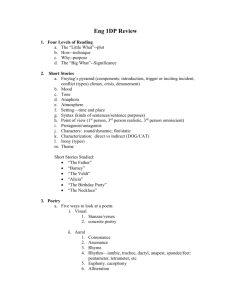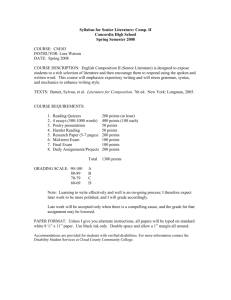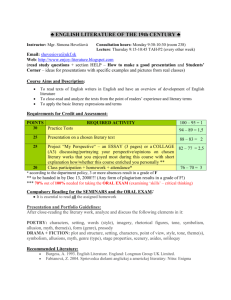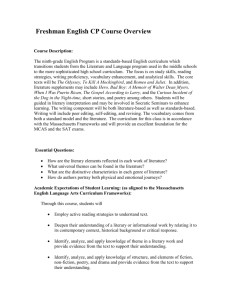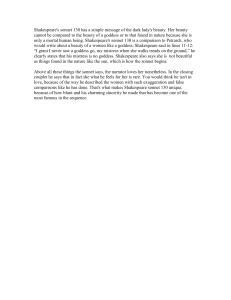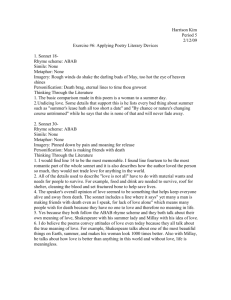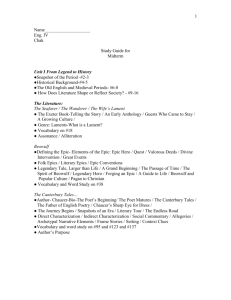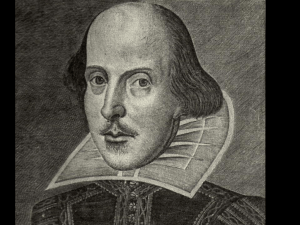16 PITCH, BOLD, CENTERED
advertisement
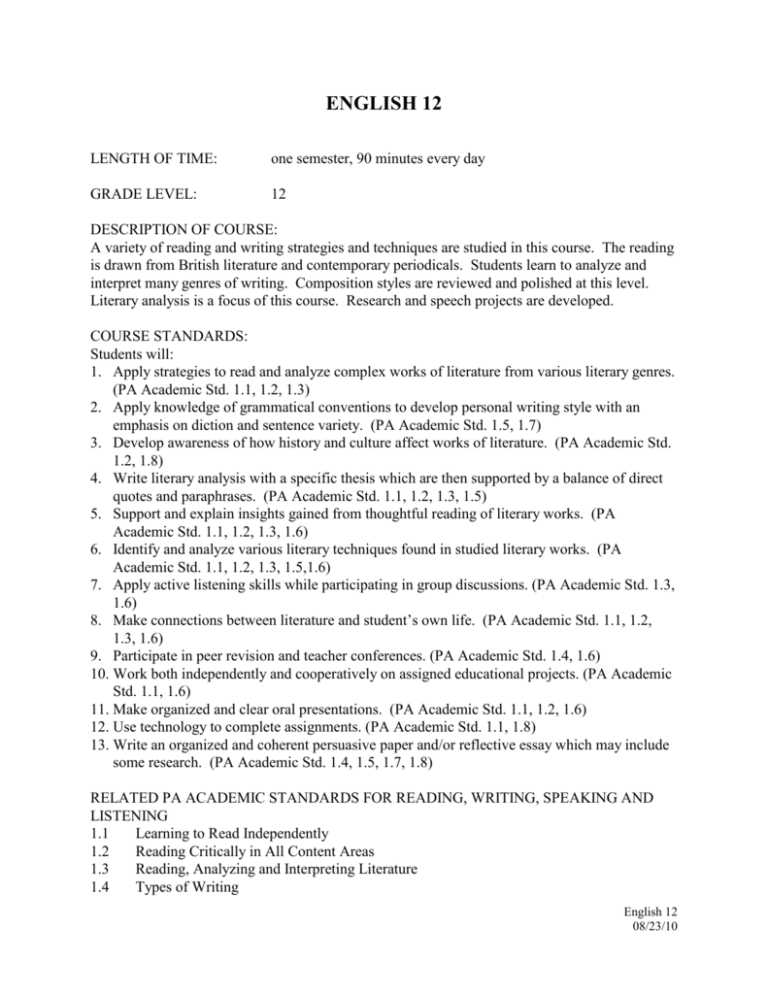
ENGLISH 12 LENGTH OF TIME: one semester, 90 minutes every day GRADE LEVEL: 12 DESCRIPTION OF COURSE: A variety of reading and writing strategies and techniques are studied in this course. The reading is drawn from British literature and contemporary periodicals. Students learn to analyze and interpret many genres of writing. Composition styles are reviewed and polished at this level. Literary analysis is a focus of this course. Research and speech projects are developed. COURSE STANDARDS: Students will: 1. Apply strategies to read and analyze complex works of literature from various literary genres. (PA Academic Std. 1.1, 1.2, 1.3) 2. Apply knowledge of grammatical conventions to develop personal writing style with an emphasis on diction and sentence variety. (PA Academic Std. 1.5, 1.7) 3. Develop awareness of how history and culture affect works of literature. (PA Academic Std. 1.2, 1.8) 4. Write literary analysis with a specific thesis which are then supported by a balance of direct quotes and paraphrases. (PA Academic Std. 1.1, 1.2, 1.3, 1.5) 5. Support and explain insights gained from thoughtful reading of literary works. (PA Academic Std. 1.1, 1.2, 1.3, 1.6) 6. Identify and analyze various literary techniques found in studied literary works. (PA Academic Std. 1.1, 1.2, 1.3, 1.5,1.6) 7. Apply active listening skills while participating in group discussions. (PA Academic Std. 1.3, 1.6) 8. Make connections between literature and student’s own life. (PA Academic Std. 1.1, 1.2, 1.3, 1.6) 9. Participate in peer revision and teacher conferences. (PA Academic Std. 1.4, 1.6) 10. Work both independently and cooperatively on assigned educational projects. (PA Academic Std. 1.1, 1.6) 11. Make organized and clear oral presentations. (PA Academic Std. 1.1, 1.2, 1.6) 12. Use technology to complete assignments. (PA Academic Std. 1.1, 1.8) 13. Write an organized and coherent persuasive paper and/or reflective essay which may include some research. (PA Academic Std. 1.4, 1.5, 1.7, 1.8) RELATED PA ACADEMIC STANDARDS FOR READING, WRITING, SPEAKING AND LISTENING 1.1 Learning to Read Independently 1.2 Reading Critically in All Content Areas 1.3 Reading, Analyzing and Interpreting Literature 1.4 Types of Writing English 12 08/23/10 1.5 1.6 1.7 1.8 Quality of Writing Speaking and Listening Characteristics and Function of the English Language Research PERFORMANCE ASSESSMENTS: Students will demonstrate achievement of the standards by: 1. Maintaining a writing folder of all published works, essay tests, and performance rubrics. (Course Standards 2,12,13) 2. Actively participating in class discussions and small group assignments. (Course Standard 5,7) 3. Completing all formal writing assignments through the publication stage. (Course Standard 2,4,5,6,8,9,10,12,13) 4. Thoughtfully and carefully completing all reading assignments punctually as evidenced by contributions to class discussions and grades on reading quizzes. (Course Standard 1,3,5,6,7,8) 5. Planning and giving oral presentations. (Course Standard 7,11) 6. Explaining and analyzing studied literature in formal and informal tests. (Course Standard 1,3,5,6,8) TITLES OF UNITS: 1. Novel 2. Tragedy 3. Poetry - many types 4. Satire 5. Persuasive paper 6. Oral presentations 7. Literary analysis 8. Usage and style 9. Literary techniques 10. Essay study 11. Reflective essay 3 weeks 5 weeks 4 weeks 3 weeks 2 weeks on going on going on going on going on going 1 week SAMPLE INSTRUCTIONAL STRATEGIES: 1. Lecture 2. Discussion 3. Think-pair-share 4. In-class writing 5. Essay tests 6. Cooperative groups 7. Journals 8. Portfolios 9. Oral presentations 10. Peer evaluation 11. Process writing English 12 08/23/10 12. Problem solving 13. Projects 14. Computer lab 15. Individual silent reading MATERIALS: Level 1 – required 1. Literature: British Literature, McDougal Littell, 2008 Units of Study: Unit 1: The Origins of a Nation Beowulf by the Beowulf Poet From the Exeter Book: “The Seafarer,” “The Wanderer,” and “The Wife’s Lament” From The Canterbury Tales: “The Prologue,” “The Pardoner’s Tale,” and “The Wife of Bath’s Tale” From Sir Gawain and the Green Knight by the Gawain Poet Unit 2: A Celebration of Human Achievement “Sonnet 18” by William Shakespeare “Sonnet 29” by William Shakespeare “Sonnet 116” by William Shakespeare “Sonnet 130” by William Shakespeare Macbeth by William Shakespeare Unit 3: Tradition and Reason “A Modest Proposal” by Jonathan Swift Unit 4: Emotion and Experimentation Poetry of William Blake Poetry of Robert Burns Poetry of William Wordsworth Unit 5: An Era of Rapid Change Poetry of Robert Browning Unit 6: New Ideas, New Voices “Shooting an Elephant” by George Orwell 2. Animal Farm, Signet, 1996 3. Death of a Salesman, Penguin, 1976 Level 1 Supplemental: 1. Literature: British Literature, McDougal Littell, 2008 Units of Study: Unit 1: The Origins of a Nation From the Exeter Book: “The Seafarer,” “The Wanderer,” and “The Wife’s Lament” From Sir Gawain and the Green Knight by the Gawain Poet Unit 2: A Celebration of Human Achievement “Sonnet 90” by Francesco Petrarch English 12 08/23/10 2. 3. 4. 5. “Sonnet 292” by Francesco Petrarch from Holinshed’s Chronicles by Raphael Holinshed Media Study: Macbeth film clips Unit 3: Tradition and Reason “An Encounter with King George III” by Fanny Burney “Madness of King George Tied to Arsenic” “A Vindication of the Rights of Woman” by Mary Wollstonecraft Unit 4: Emotion and Experimentation Poetry of Samuel Taylor Coleridge Poetry of George Gordon, Lord Byron Poetry of John Keats Unit 5: An Era of Rapid Change Poetry of Elizabeth Barrett Browning Poetry of Emily Bronte Unit 6: New Ideas, New Voices “A Devoted Son” by Anita Desai Media Study: Perceptions Shaped by the News Hamlet, Folger Shakespeare Library, 1992 Brave New World, Econoclad, 1989 1984, Econoclad, 1984 Literature Sound & Sense, Perrine, Harcourt Brace Level 2 – Required 1. Animal Farm, Signet, 1996 2. Death of a Salesman, Penguin, 1976 3. Literature: British Literature, McDougal Littell, 2008 Units of Study: Unit 1: The Origins of a Nation Beowulf by the Beowulf Poet From The Canterbury Tales: “The Prologue,” “The Pardoner’s Tale,” and “The Wife of Bath’s Tale” Unit 2: A Celebration of Human Achievement “Sonnet 18” by William Shakespeare “Sonnet 29” by William Shakespeare “Sonnet 116” by William Shakespeare “Sonnet 130” by William Shakespeare Macbeth by William Shakespeare Unit 3: Tradition and Reason “A Modest Proposal” by Jonathan Swift Unit 4: Emotion and Experimentation Poetry of Robert Burns Unit 5: An Era of Rapid Change Poetry of Robert Browning Unit 6: New Ideas, New Voices “Shooting an Elephant” by George Orwell English 12 08/23/10 Level 2 Supplemental: 1. Literature: British Literature, McDougal Littell, 2008 Any units, stories, or poems studied in the English 12 -1 course 2. Macbeth: A Parallel Text, Perfection Learning, 1998 METHODS OF ASSISTANCE AND ENRICHMENT: 1. Opportunities are provided for retesting and rewriting compositions 2. Opportunities are provided for private conferencing and tutoring 3. McDougal Littell literature differentiated strategies PORTFOLIO DEVELOPMENT: 1. Any paper completed and graded 2. Presentation rubrics 3. 12th grade reflective essay METHODS OF EVALUATION: 1. Tests 2. Quizzes 3. Composition rubrics 4. Project and presentation rubrics 5. Reflective essay 6. Persuasive paper 7. Homework INTEGRATED ACTIVITIES: 1. Concepts -literary genres -literary techniques -literary analysis -composition and essay content, mechanics, syntax, and diction 2. Communication -discussion of literature -peer evaluations -self evaluations -participation in partner and group assignments -oral presentations 3. Thinking/Problem Solving -analyzing literature -in class writing -inferring meanings and drawing conclusions from literature studied English 12 08/23/10 4. Application of Knowledge -writing literary analysis -discussing and explaining literature -mechanics usage -development of precise diction and appropriate syntax in student writings -using correct punctuation 5. Interpersonal Skills -small group work -presentations -discussions -projects English 12 08/23/10
